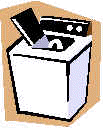


by David Bloomberg
Cleaned Out| These things have been around for years now, and I just have to wonder what took the FTC so long to finally act. Was it really that difficult to run a test of plain water vs. laundry balls vs. detergent? |
Many of you have probably heard of "laundry balls" – little plastic balls that were supposed to replace detergent and magically clean your clothes by emitting negative charges to force dirt off the laundry (or some variant like that). They’ve been around for quite some time, and the Federal Trade Commission (FTC) finally got around to doing something about these claims.
 The FTC has stopped
two of these companies from making their claims, but the settlement reached did not, of
course, require the firms to admit wrongdoing for their past claims. According to the AP
Wire (4/23), the director of the FTC’s Bureau of Consumer Protection said tests
showed the laundry balls "do little more than clean out your wallet" – not
your clothes.
The FTC has stopped
two of these companies from making their claims, but the settlement reached did not, of
course, require the firms to admit wrongdoing for their past claims. According to the AP
Wire (4/23), the director of the FTC’s Bureau of Consumer Protection said tests
showed the laundry balls "do little more than clean out your wallet" – not
your clothes.
These things have been around for years now, and I just have to wonder what took the FTC so long to finally act. Sure, the companies have to stop making their claims now, but how much money have they made off of these things, which sold for up to $75 each? Was it really that difficult to run a test of plain water vs. laundry balls vs. detergent? The answer, of course, is no – Consumer Reports tested these back in 1995 (and, not surprisingly, found they didn’t work). I think the FTC needs to clean up these things a bit faster in the future.
Money magazine had a surprisingly good article on chiropractic in May. I say it was surprisingly good because it went into a fair amount of detail that is most often left out of popular-press articles of this type.
For example, the author discusses the studies showing that physical therapy and a combination of rest and pain medicine plus exercise can be as effective at treating back pain – at lower cost. The author also points out that there is "no conclusive clinical evidence that chiropractic helps chronic back pain," which is one reason many people go to chiropractors.
Most importantly is the author’s dividing up of chiropractors into two groups. She notes that "Roughly 80% of chiropractors believe that spinal misalignment is a significant cause of disease," and adds, "If yours endorses chiropractic’s use for nonmusculoskeletal problems, such as asthma (for which studies show it is not useful), or encourages you to think of him or her as a primary-care provider, you may want to choose someone else." She also warns consumers away from chiropractors who want to prescribe herbs or homeopathic remedies.
The author also talks about "scientifically oriented chiropractors," who treat only musculoskeletal conditions (she even gives a phone number and website to find these "good" types).
The article ends on a good note, explaining that medical experts (except most chiropractors, of course) do not recommend routine chiropractic visits as a way to prevent future problems. This means people should not have standing appointments with a chiropractor, and I hope that a few of the many people who have such scheduled visits read this article and think about whether that type of chiropractic is all it’s cracked up to be.
A Chicago Tribune article on the placebo effect in the "Tempo" section? (5/11) My immediate reaction was, "Uh oh." As regular readers of this column know, the Tribune does not have a stellar record when it comes to these types of articles.
But, lo and behold, this time it was different! An intelligent article that discussed the placebo effect in detail, talking to all the right people, and pointing out all the right things. Amazing!
A psychiatrist explained that certain medical conditions, such as pain, depression, and panic attacks, are more responsive to placebo than, for example, bacterial infections. Considering that the placebo-responsive conditions tend to be more dependent on subjective interpretations of the patient, this makes a great deal of sense. As a psychology professor noted, "Placebo pain reduction depends on people expecting pain to be reduced."
Some studies of the placebo effect have shown how effective it can be in these situations. However, many in the realm of alternative medicine have tended to miss this information, especially when they don’t do proper double-blind experiments.
One doctor noted, "Expectations play a role in the placebo effect. What people expect is going to happen to them often is what happens." Well, I certainly never expected to see such a good article on the placebo effect in the "Tempo" section of the Tribune, but maybe I can hope a few of their other columnists who write about alternative medicine and the like for that publication pay at least a little attention to this information.